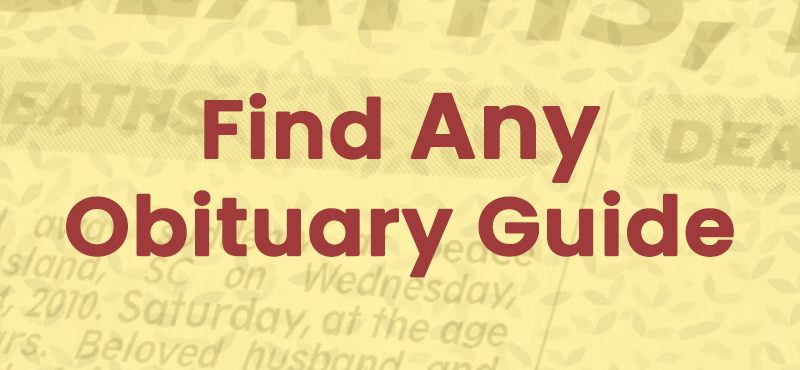Finding a specific person’s obituary or death notice can be tricky, especially if they passed away many decades ago.
But just because something is hard doesn’t mean it’s impossible. As a lawyer, I have years of experience finding people who are trying to avoid being found.
So, I’ve picked up a few tips and tricks for finding people. And I can assure you that various methods, sources, and tools are available to find an obituary for a specific person. Many of them don’t cost any money, either.
In this comprehensive guide, I’ll take you through 10 steps you can follow, share my favorite tools to find obituaries online, and show examples. I’ll top it off with answers to frequently asked questions people on these sorts of searches have.
Read on to learn everything you need to know about finding that obituary that eludes you.
Related Article: The 12 Best Obituaries Ever Written [Famous Obit Examples]
Our Favorite Tool

The most popular website specializing in obituaries and death notices with millions of records from newspapers all over the world.
Note: This guide is structured to get your result as fast as possible, in the most cost-effective way possible. The obvious steps come first, with the more advanced steps coming later. If you’ve already tried one of the suggested avenues (e.g., Googling the deceased), feel free to skip forward using the table of contents below).
In This Article
Collect Information Likely to Appear in the Person’s Obituary

Before starting your search, a preliminary step in finding an obituary for a specific person is to gather as much information about them as possible.
Obituaries usually contain a lot of biographical information (such as locations, cemetery, and family information). We can use this to our advantage:
While we may not know “John Smith’s” date of death, his obituary probably references his wife. So if we have her name, we will increase our chances of finding a match for him.
The most helpful information is the deceased’s:
- Full name,
- Date of birth,
- Date of death,
- Location where they lived,
- Location where they died.
You probably have enough information to get started if you can pull together these five things. However, other information that can be helpful includes:
- Their occupation(s) and hobbies,
- Where and/or when they were employed,
- Where they were born,
- Details of anyone they married,
- Details of when and where they got married,
- Details of any other relatives, family members, or friends they had,
- Where and when they went to school or university,
- Any qualifications they received,
- Anything else associated with them that might be registered with the government. For example, if they were in the military or worked for a local court,
- Where they were buried or interred,
- Where they had their funeral.
Tip: Ask Family Members
One of the best sources of information about a person’s life is their family members.
Reach out to relatives of the deceased and ask if they have any information or documents that could help you in your search.
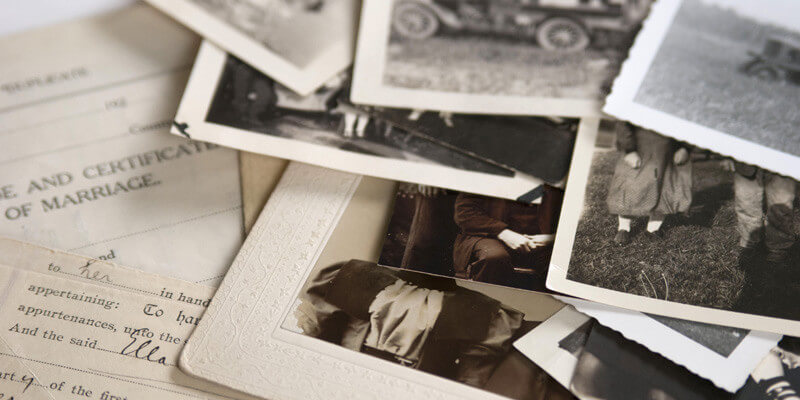
Old dated photographs, a death certificate, letters they sent or received when they were alive, anything! You never know; someone might have a copy of the obituary themselves.
If you’re not that close to family members of the person whose obituary you’re looking for, don’t feel awkward. Send off that Facebook message. The worst thing they can do is ignore you or say “no.”
Tip: Partial Matches Are Better Than Nothing
Even half-complete information or data ranges can be useful if you cannot find exact information about the deceased.
For example, if you know:
- Your great-grandfather died before your great-grandmother,
- Your great-grandmother died in 1954, and
- A picture exists of your great-grandfather and great-grandmother together in 1951.
Then you know that your great-grandfather’s death date is between 1951 and 1954.
This same logic applies to location. Knowing the town in which the deceased lived or died is obviously more helpful than the state, but a state is better than nothing.
10 Steps to Find an Obituary for a Specific Person
1. Google Their Name and Other Information About Them
There is no better place to start than Google to find an obituary online. Most of the time, especially if the person’s death was in the last 10 – 15 years, you will find what you’re looking for.
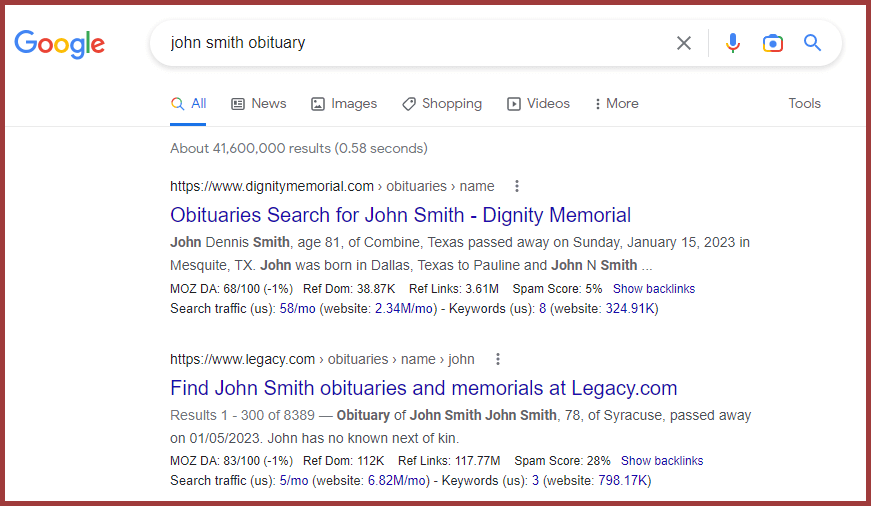
If you’ve already searched their name without luck, there’s more you should try, such as:
- If you know the location where the person lived or died, include that information in your search (e.g., “John Smith Obituary New York”),
- Try including the names of the deceased’s relatives in your search (e.g., “John Smith Jane Smith Obituary”),
- Search for variations with middle names excluded or middle initials included,
- If the person you’re searching for is a woman, try searching with both their maiden name and their surname by marriage,
- Try different combinations of keywords to see what comes up, including words like “obituary,” “death notice,” or “funeral announcement” in your search,
- Use quotation marks around the person’s name to search for exact or closer matches,
- Try using advanced search operators to filter your results by date (“daterange:[XXXXX-XXXXX]”) if you know when the person died,
- Try Google images rather than Google itself. The Google Images index will often show different results that might be more relevant.
Google will not always give you a match. In my experience, once you’re looking back past 2005, Google is much less helpful.
You could also try other search engines, like Bing or Yahoo, but my experience is that they usually have fewer results than Google.
2. Search Obituary Websites Like Legacy.com and LifeMemory
There are many websites online dedicated to keeping records of obituaries and memorials.
I’ll feature two of the most popular, but I’ll also link to several other alternatives you can try.
Legacy.com

Legacy.com is probably the most popular website specializing in obituaries, death notices, guest books, and memorial websites. Unfortunately, they only go back as far as 1999.
For anything post-1999, I wouldn’t classify Legacy as the best (for anything older than 30 days, you usually have to pay a fee).
But it’s quick, easy to use, and they have a lot of content (they claim to have obituaries for over 70% of all US deaths, and they also have databases for Australia, Canada, the United Kingdom, and many other countries).
Legacy.com also has a lot of filtering options for an obituary search. You can search by name, city, high school, death date, and more.
At a minimum, you should be able to confirm whether an obituary exists in Legacy’s database. If it does, you can choose to pay to access it quickly, or you can move on to other options.
LifeMemory

LifeMemory is another great website to find obituaries online. They have a vast database of relatively recent obituaries.
Unlike Legacy, who draw most of their obituaries from local newspapers, LifeMemory appears to scrape them directly from funeral home websites.
So, if you can’t find the obituary on Legacy, LifeMemory is worth checking out.
Other Obituary Websites
Beyond the two options I’ve featured above, there are other smaller obituary websites to look into. These include Ever Loved, Tributes.com, Forever Missed, and Kudoboard.
Unfortunately, all these websites suffer from the same fundamental drawback: Their records don’t go back very far.
Certain religions and governments also keep their own obituary records to help people find an obituary for a specific person.
For example, in Canada, you can request obituaries from Library and Archives Canada. For other commonwealth countries, you can contact the “Birth, Deaths, and Marriages” department if they have one.
In terms of religions, Mennonites and Mormons both keep their own databases of obituaries and tributes for their members.
3. Look Them up on Genealogy Websites Like FamilySearch.org

Genealogy websites specialize in collecting and organizing information about family history and family trees. They usually have census data, death records, marriage records, and more.
So, they are not focused solely on obituaries. However, they often index them. And unlike the obituary sites featured above, they usually have historical records that go much further back in time.
Unfortunately, most (but not all) genealogy websites will only allow you to search for free and see a summary. Most “real” key information is hidden unless you pay.
A few sites worth trying are:
Ancestry.com
Ancestry.com is the largest genealogy resource in the world, holding billions of documents dating back centuries.
Their most helpful resource if you’re looking for old obituaries for a particular individual is their U.S. Obituary Collection which has records dating from 1930 to the present. You can also try their section for “Death, Burial, Cemetery & Obituaries,” which has older records and entries for other countries too.
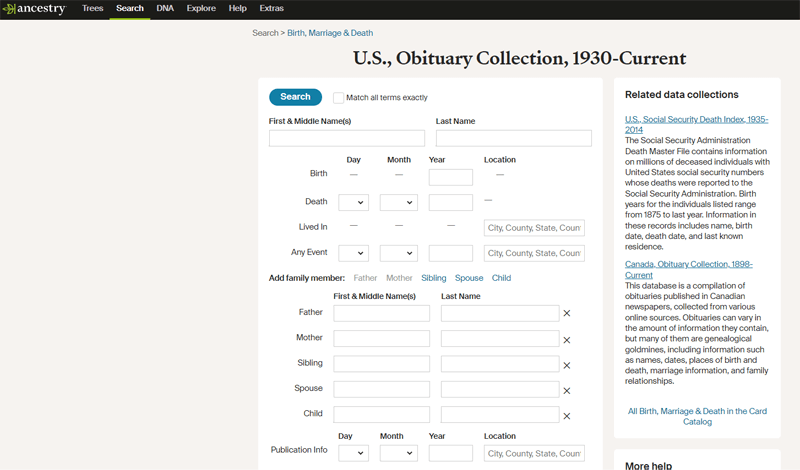
Most of Ancestry’s data is hidden behind a paywall and requires a monthly subscription to bypass.
The cost of the subscription varies, but you will typically be looking at $25.00 minimum for a month’s worth of access unless a free trial is available when you visit.
For some people, this is worth it. Ancestry really has a lot of data. I’ve personally found it a quick way to see many obituaries dated pre-2000 that I couldn’t find through Google.
FamilySearch.org

FamilySearch.org is a free alternative to Ancestry.com, run by the Mormon Church.
It has a lot of the same information as Ancestry.com, with some downsides:
- It is harder to use,
- Many documents are not searchable (even though they exist on the site!)
FamilySearch has a real focus on true historical data. The most up-to-date stuff is noticeably lacking.
But if you find what you’re looking for on Ancestry and want to avoid paying, it’s worth searching for the specific person’s obituary using FamilySearch and filtering using their “Collections Title” filter to see if you can find it for free.
Other Genealogy Sites
Other Genealogy Sites you may wish to consider searching for the individual whose obituary you’re looking for include:
- MyHeritage.com, which has a lot of European records other sites don’t,
- AfriGeneas, which has a lot of data on African Americans,
- Findmypast.com, which has lots of content for England, Scotland, Ireland, Wales, and other commonwealth countries,
- Geni.com is a site that focuses primarily on family trees but can enable people to discover relatives who might have more information to share.
Other free or open-source alternatives also include AccessGenealogy.com and WikiTree.com.
4. Review Newspapers From the Cities and States They Lived In

Most older obituaries were published in regional and local newspapers, so these are another great place to look.
There are free and paid options available:
Paid Options: Newspapers.com and GenealogyBank
Newspapers.com

Newspapers.com is a sister site to Ancestry.com that has hundreds of thousands of obituary archives dating as far back as the 1700s.
They don’t have as many small-town local newspapers archived as I would like. Still, if the specific person you’re looking for lived or died in any not-too-rural place, and you don’t mind spending a little bit of money, Newspapers.com is the best option. Try filtering by death date for the best results.
GenealogyBank
GenealogyBank also has thousands of easy-to-search digitized newspapers, with a particular focus on the 260+ million obituaries and death notices in their database (many of which can’t be easily found elsewhere, especially for Midwestern states).
They are quite a bit cheaper than Newspapers.com and definitely worth a look.
NewspaperArchive.com
Some people like NewspaperArchive.com, but their reviews are overwhelmingly negative for making sneaky credit card charges.
I haven’t had any problems with them myself, but I suggest avoiding them regardless – most of what they have you can find elsewhere.
Free Options: Google News, Library of Congress, and Local Papers
If you want to search old newspapers for free, a little bit more “manual” work will likely be required.
Ideally, you should know the deceased person’s city or region of death, or at least where they lived when they were alive. From there, you can determine the relevant newspapers to search.
Once you’ve got a lead, the Google News Archive is a great place to start (bonus link to help with navigating Google News). Google News has a ton of “historical digital publications and scanned newspapers.”
If Google News is too much of an information overload, there are several other free options to consider depending on the location you’re searching in:
USA: Chronicling America
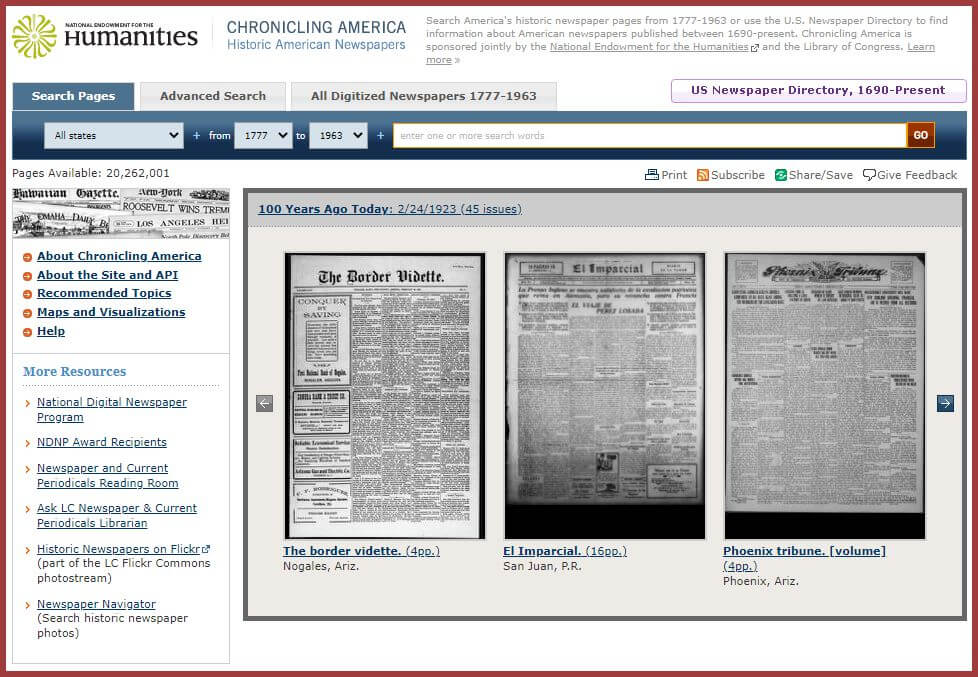
The Chronicling America website is managed by the US Library of Congress. The site has 15+ million scanned pages of American newspapers published between the 1770s and 1960s.
While a great resource, the digitizations often have a lot of errors which can make searching difficult. For example, if you do an obituary search for “John Smith” but Chronicling America’s OCR software scanned that text as “J0hn Sm1th”, you won’t have any luck.
It’s certainly worth a try, though.
Australia, New Zealand, and Singapore: Elephind.com
Elephind.com has everything Chronicling America has, plus a bunch of other digitized newspapers from countries like Australia and New Zealand. Their search function is also much more intuitive than the one on the official Chronicling America website.
New York State: NYS Historic Newspapers and FultonHistory.com
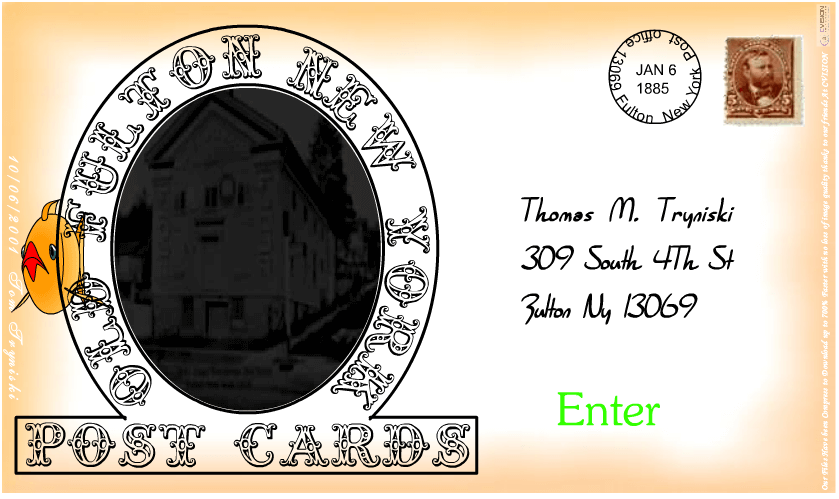
If the specific person you’re looking for lived or died in New York, you’re in luck because there are a ton of online resources for this state. I suggest checking out NYS Historic Newspapers or Tom Tryniski’s FultonHistory.com, two great free (albeit tricky to navigate) options.
Other States
If you’re anywhere else in the USA and are still looking for newspapers that were published in your state, I recommend using this resource from The Ancestor Hunt. The team over there links to tens of thousands of digitized newspapers broken down by state, city, and date to help people track down their ancestors.
SmalltownPapers.com offers something similar, although their collection is quite a bit smaller.
The Chronicling America Website linked above also offers a directory of newspapers in the USA going back as far as 1690, including ones that still need to be digitized and information on where to find them.
Time For a Breather
You’re still here!
I was really hoping the resources above would be enough to enable you to find the obituary for the specific person you’re looking for.
If you’re struggling, feel free to comment at the end of this article, and we’ll see if we can help.
Otherwise, keep reading for more options.
5. Contact or Visit Your Local Library or Historical Society

Going to a public library or contacting a historical society may seem like an old-fashioned approach to finding an obituary, especially considering all our previous steps could be followed entirely online.
However, it’s definitely something worth trying.
Many libraries have local newspapers and other historical documents on microfilm or in print that can be searched for obituaries and death notices. This often includes newspapers that are not yet searchable online.
Furthermore, many libraries have free-to-use subscriptions to previously mentioned newspaper and genealogy services that would otherwise cost a lot of money. For example, my local library has Ancestry.com, Newspapers.com, GenealogyBank, and Legacy.com subscriptions that I can use for free.
A final benefit of visiting the library or historical society, or simply giving them a call, is that they might have a researcher or volunteer on staff with experience, willing and able to help you in your search, or at least point you in the right direction or offer you a look-up service.
6. See if You Can Find Their Name in Obituary Indexes
Slightly different from genealogy, newspaper, and obituary sites, are obituary indexes.
Obituary indexes are centralized records kept of existing obituaries that haven’t necessarily been digitized yet; they usually record deceased names, dates of deaths, and the newspaper the obituary was published in.
A complete list of obituary index links for all states in the USA and regions of Canada can be found here. If you find the obituary you’re looking for, you’ll usually have to contact the library or society that holds the obituary directly to obtain a copy. They might charge a small fee for this.
Other “one-stop-shop” obituary indexes you can search include DeathIndexes.com’s Death Index and Ancestry.com’s “U.S., Newspapers.com Obituary Index, 1800s-current”.
7. Visit Your State or National Archives

I mentioned above that some countries (like Canada) keep centralized databases of obituaries.
Many countries don’t, but you can still visit and search your State or National archives for old records and copies of newspapers and death notices you haven’t been able to find elsewhere.
I suggest contacting the archive in advance to ensure you aren’t just going to waste your time, but this really can be a good option if all else so far has failed.
8. Think Outside the Box for Less Typical Resources to Search
Most of the options we’ve covered so far are “major” resources where a lot of information is stored, but there are other less obvious places you could consider searching.
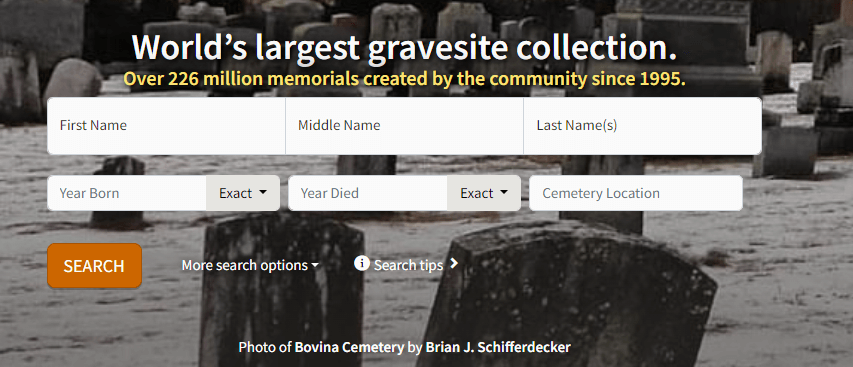
For example, if you know where the deceased is or might be buried, search FindAGrave.com. This is a free website contributed to by users, primarily for locating graves of specific people, but that will often link to or provide obituaries if they can find them.
Funeral Homes and cemeteries are also good places to contact if you know where the deceased had their funeral or was buried.
Another example of outside-the-box thinking is, if you know what the person’s profession was before they died, you could consider contacting other people in that profession or searching through industry publications that might have mentioned them.
For example, in New Zealand, almost all lawyer deaths will be published with an obituary in our weekly lawyers’ magazine. Even someone without a family member who chose to make an obituary for them in a newspaper will likely have something published there.
9. Use a Background Check Service
If no other methods are working for you, consider using a background check service. These are websites that provide access to public records, including obituaries, death records, and other personal information.
The best service by far in my experience is TruthFinder.com.They have a website that, in my opinion, does not inspire much trust, but they have been good for me with finding leads I just couldn’t find anywhere else.
These types of services won’t show you the obituary directly, but they should at least give you more information to go on that you can then use to find the obituary.
It’s worth noting that while these services are convenient, a lot of the time they are not accurate or up-to-date. Put simply, your mileage will vary.
10. Consider a Private Detective or Professional Genealogist
Finally, we have the “nuclear option” for those all out of luck and with some real money to burn: A private detective or professional genealogist.
This may sound like an over-the-top option, but if you’re willing to spend the money and an obituary exists, they will find it. If they don’t, you can be confident that the obituary simply doesn’t exist. They have the tools and expertise that us mere mortals don’t.
Unlike the many other resources in this guide, I don’t have any particular private detectives or genealogists that I can personally recommend. But hey, if you’ve gone down this route and know someone good, please do leave a comment below!
Frequently Asked Questions
How Do I Find an Obituary With Only a Name?
If you only have the deceased person’s name and no other information, the best place to find their obituary will be by searching their name in online databases like Legacy.com or Newspaper.com.
If you don’t get anywhere with that, I think you’re going to have a tough time finding much with a name alone. You should consider trying as hard as possible to find more information as set out in our preliminary step on this page and then using that information to search other resources I’ve shared above.
Does Everyone Have an Obituary?
Not everyone has an obituary, especially if they passed away many years ago or lived in a rural area. Obituaries are typically published in local newspapers or online, so if the person had no surviving family or friends, there may not have been anyone to write or publish the obituary.
Furthermore, in some cases, the deceased’s family may have chosen not to publish an obituary for personal or financial reasons. So if you’re really having trouble finding an obituary for a specific person, it’s possible that one was never published.
What’s the Difference Between an Obituary and a Death Notice?
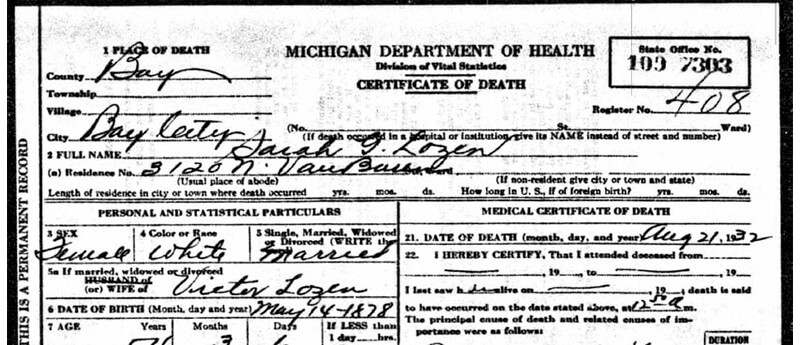
A death notice is a brief announcement of a person’s death, often published in newspapers by the deceased’s family. It provides basic information about the deceased and their funeral arrangements.
On the other hand, an obituary is a more detailed and personalized memorial, tribute, or account of a person’s life and legacy, often including stories, anecdotes, and quotes from family and friends, as well as information about their accomplishments, interests, and personality.
Conclusion
Finding an obituary for a specific person can be a challenging and time-consuming task.
However, by following the steps outlined in this guide and utilizing the various resources I’ve linked to, you should be able to find the obituary if it exists.
While it’s not uncommon for a person not to have an obituary, it’s still worth trying different methods to locate one as it can provide valuable information about a loved one’s life and legacy.
If you have any further questions about finding an obituary or anything else beyond life, please feel free to leave a comment below or get in touch.

